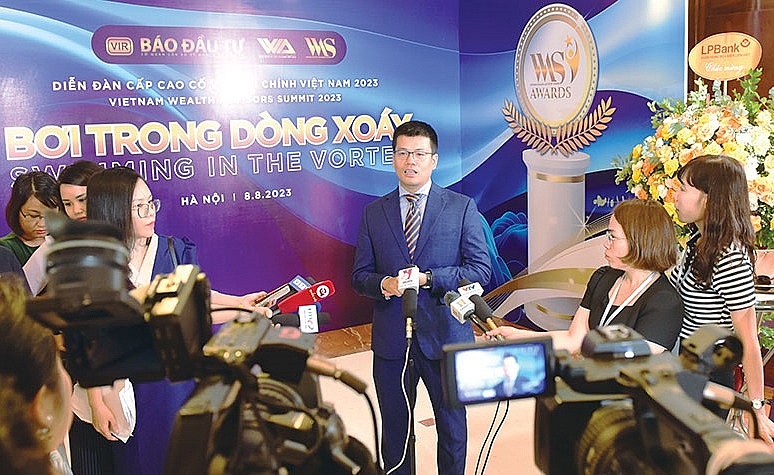Securities entrants intensify capital dynamics in Vietnam
At its extraordinary general meeting for 2023, DNSE Securities outlined the proposed expansion of its charter capital and an impending initial public offering (IPO).
 |
| Securities entrants intensify capital dynamics in Vietnam |
DNSE is looking to float an additional 36 million shares. This move aims to elevate the charter capital from VND3 trillion ($126.58 million) to VND3.36 trillion ($141.77 million). The strategy involves an IPO of 30 million shares and a 6 million share issuance under the employee stock option plan.
The execution timeline for this IPO stretches between Q4 and into Q2 next year. As for the proceeds from this venture, DNSE plans a 50 per cent allocation for reinforcing capital related to pre-sales services, margin transactions, and other core company operations. Some 40 per cent is set aside for proprietary trading and security investments, and the remainder is pegged for infrastructure enhancement, system growth, and other legal undertakings.
In the broader picture of the Vietnamese securities sector, DNSE is not the only firm bolstering its charter capital. The industry is buzzing with firms eyeing significant capital injections. For instance, earlier this month, VNDirect’s board approved the issuance of a staggering 304.46 million shares. A major chunk of these, around 243.56 million shares, are destined for public distribution.
This initiative forms part of VNDirect’s grand strategy to raise its capital ceiling to a remarkable VND18 trillion ($759.5 million). If successful, this move will catapult VNDirect’s capital profile, marking an eightfold increase from its 2020 figures, positioning it as a behemoth in the sector.
Echoing this momentum, TCBS, with Techcombank’s backing, recently executed a major capital increment, pushing its total equity capital beyond VND22 trillion ($928.27 million). This surge momentarily positioned TCBS as the top securities firm in terms of equity capital in Vietnam, even outpacing giants like SSI.
The narrative threading the Vietnamese securities sector is the aggressive pursuit of capital. The last two years have seen industry heavyweights, including SSI, VCI, VIX, and even bank-affiliated firms like SHS, MBS, BSI, and VPBankS, making strategic moves to harness the surging stock market.
The crescendo perhaps came with VPBankS which pulled off a massive VND15 trillion ($632.9 million) capital raise in Q4 2022, solidifying its third-place in the equity capital rankings.
The dynamic is further intensified by new entrants. Firms from South Korea and Taiwan are making their mark, while the ascent of VPS is redefining competitive norms. Notably, ORS is making swift strides towards bolstering its capital, targeting VND4 trillion ($168.8 million) via a 100 million share issuance.
According to statistics compiled from 25 securities companies, the aggregate charter capital by the end of the first quarter of 2021 amounted to nearly $1.9 billion. However, by the conclusion of the second quarter, this figure had surged to approximately $4.7 billion, marking an increase of 2.5 times.
Nguyen The Minh, analysis director at Yuanta Securities Vietnam, stated that for securities firms primarily offering brokerage and margin lending services, the return on equity (ROE) stands at around 7-8 per cent.
“However, this could spike to 15-20 per cent for firms majorly driven by proprietary trading activities,” Minh said. He also highlighted that the market’s zenith in 2021 saw significant profits from proprietary trading. “However, 2022 posed challenges, negatively impacting many securities firms’ proprietary trading and subsequently their ROE. Additionally, certain securities companies have been constrained by investments in bonds. To ensure adequate operational funds, they’ve opted to raise capital. But in practice, a significant portion of these funds remains unused,” he added.
 | Trends set to dictate a robust economy Amidst prevailing economic challenges, businesses and investors find themselves navigating a landscape where opportunities are progressively limited and accompanied by heightened costs. |
What the stars mean:
★ Poor ★ ★ Promising ★★★ Good ★★★★ Very good ★★★★★ Exceptional
Related Contents
Latest News
More News
- Cashless payments hit 28 times GDP in 2025 (February 04, 2026 | 18:09)
- SSIAM and DBJ launch Japan Vietnam Capital Fund (February 04, 2026 | 15:57)
- Banks target stronger profits, credit growth in 2026 (February 04, 2026 | 15:43)
- Vietnam on path to investment-grade rating (February 03, 2026 | 13:07)
- Consumer finance sector posts sharp profit growth (February 03, 2026 | 13:05)
- Insurance market building the next chapter of protection (February 02, 2026 | 11:16)
- NAB Innovation Centre underscores Vietnam’s appeal for tech investment (January 30, 2026 | 11:16)
- Vietnam strengthens public debt management with World Bank and IMF (January 30, 2026 | 11:00)
- Corporate bond market poised for stronger growth cycle (January 28, 2026 | 17:13)
- Vietnam's IPO market on recovery trajectory (January 28, 2026 | 17:04)

 Tag:
Tag:


















 Mobile Version
Mobile Version